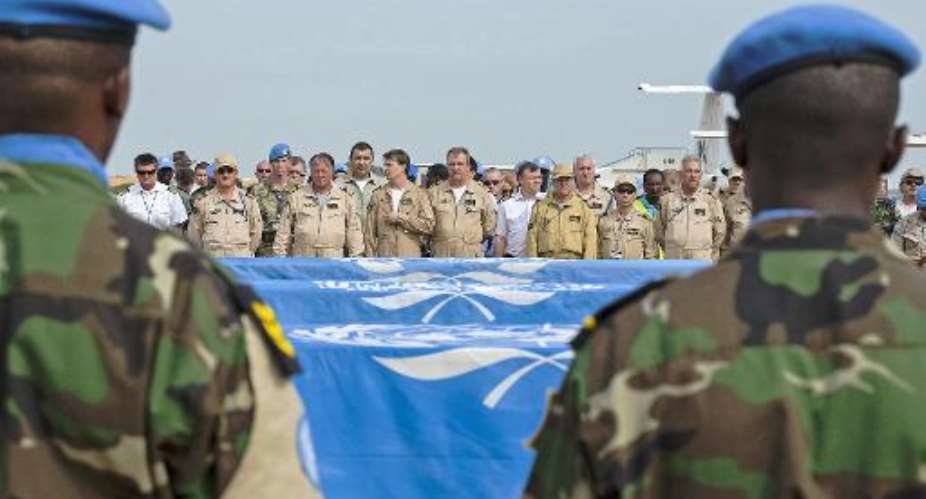Juba (AFP) - The United Nations mission in South Sudan on Tuesday implicated a rebel leader in the shooting down of one of its aid helicopters last month.
A statement from UNMISS said preliminary investigations into the circumstances surrounding the August 26 crash of the Mi-8 helicopter, which killed three Russian crewmen and injured a fourth, had "uncovered evidence indicating that the aircraft was shot down".
UNMISS also revealed that Peter Gadet, the leader of South Sudanese rebel forces in the area, had alleged during a phone call with UN staff prior to the incident that the UN flights were being used to transport government troops.
During the phone call, Gadet "threatened to shoot down the mission's aircraft", the statement said.
"It is premature at this stage to conclusively apportion blame for the shooting down of the helicopter," the UN said, but added that further investigations "will make it possible to conclusively determine the source of the ground fire which brought down the helicopter."
Both the United States and the European Union have slapped sanctions on Gadet over atrocities committed in South Sudan's civil war.
Thousands of people have been killed and more than 1.8 million have fled a war sparked by a power struggle between President Salva Kiir and his sacked deputy Riek Machar.
The army and rebels have both accused each other of the attack, which broke a day-old ceasefire deal, the fourth in eight months of war.
UN cargo helicopters are vital to supplying UN peacekeeping bases and providing food for civilians who have taken refuge in the bases following a wave of ethnic violence.
Helicopters are also crucial in reaching remote regions hardest hit by the fighting, which aid agencies say has pushed the country to the brink of famine.





 Whoever participated in the plunder of the state must be held accountable – Jane...
Whoever participated in the plunder of the state must be held accountable – Jane...
 A vote for John and Jane is a vote to pull Ghana from the precipice of destructi...
A vote for John and Jane is a vote to pull Ghana from the precipice of destructi...
 I’ll repay your abiding confidence with loyalty, understanding and a devotion to...
I’ll repay your abiding confidence with loyalty, understanding and a devotion to...
 ‘I’ve learnt deeply useful lessons for the future' — Serwaa Amihere breaks silen...
‘I’ve learnt deeply useful lessons for the future' — Serwaa Amihere breaks silen...
 I’m sorry for the embarrassment – Serwaa Amihere apologises for leaked sex video
I’m sorry for the embarrassment – Serwaa Amihere apologises for leaked sex video
 Dumsor: Matthew Opoku Prempeh not in charge of Energy sector – Minority
Dumsor: Matthew Opoku Prempeh not in charge of Energy sector – Minority
 Adu Boahen’s murder: Police arrest house help who was in possession of deceased’...
Adu Boahen’s murder: Police arrest house help who was in possession of deceased’...
 Akufo-Addo nominates Felicia Attipoe as Tema West MCE
Akufo-Addo nominates Felicia Attipoe as Tema West MCE
 Election 2024: I can't have someone I defeated twice as my successor – Akufo-Add...
Election 2024: I can't have someone I defeated twice as my successor – Akufo-Add...
